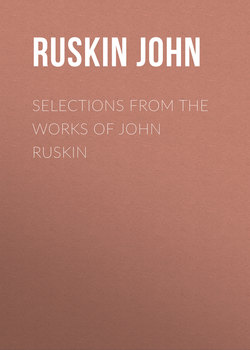Selections From the Works of John Ruskin

Реклама. ООО «ЛитРес», ИНН: 7719571260.
Оглавление
Ruskin John. Selections From the Works of John Ruskin
PREFACE
Introduction
I. THE LIFE OF RUSKIN
II. THE UNITY OF RUSKIN'S WRITINGS
III. RUSKIN'S STYLE
Selections from Modern Painters
THE EARTH-VEIL. VOLUME V, CHAPTER I
THE MOUNTAIN GLORY. VOLUME IV, CHAPTER 20
SUNRISE ON THE ALPS31. VOLUME I, SECTION 3, PART 2, CHAPTER 4
THE GRAND STYLE36. VOLUME III, CHAPTER I
OF REALIZATION. VOLUME III, CHAPTER 2
OF THE NOVELTY OF LANDSCAPE. VOLUME III, CHAPTER II
OF THE PATHETIC FALLACY. VOLUME III, CHAPTER 12
OF CLASSICAL LANDSCAPE. VOLUME III, CHAPTER 13
OF MODERN LANDSCAPE. VOLUME III, CHAPTER 16
THE TWO BOYHOODS. VOLUME V, PART 9, CHAPTER 9
Selections from The Stones of Venice
THE THRONE. VOLUME II, CHAPTER I
ST. MARK'S. VOLUME II, CHAPTER 4
CHARACTERISTICS OF GOTHIC ARCHITECTURE. VOLUME II, CHAPTER 6
Selections from The Seven Lamps of Architecture
THE LAMP OF MEMORY
THE LAMP OF OBEDIENCE
Selections from Lectures on Art
INAUGURAL
THE RELATION OF ART TO MORALS
THE RELATION OF ART TO USE
Art and History
ATHENA ERGANE
TRAFFIC203
Life and Its Arts
Отрывок из книги
It is distinctive of the nineteenth century that in its passion for criticising everything in heaven and earth it by no means spared to criticise itself. Alike in Carlyle's fulminations against its insincerity, in Arnold's nice ridicule of Philistinism, and in Ruskin's repudiation of everything modern, we detect that fine dissatisfaction with the age which is perhaps only proof of its idealistic trend. For the various ills of society, each of these men had his panacea. What Carlyle had found in hero-worship and Arnold in Hellenic culture, Ruskin sought in the study of art; and it is of the last importance to remember that throughout his work he regarded himself not merely as a writer on painting or buildings or myths or landscape, but as the appointed critic of the age. For there existed in him, side by side with his consuming love of the beautiful, a rigorous Puritanism which was constantly correcting any tendency toward a mere cult of the aesthetic. It is with the interaction of these two forces that any study of the life and writings of Ruskin should be primarily concerned.
It is easy to trace in the life of Ruskin these two forces tending respectively toward the love of beauty and toward the contempt of mere beauty. They are, indeed, present from the beginning. He inherited from his Scotch parents that upright fearlessness which has always characterized the race. His stern mother "devoted him to God before he was born,"1 and she guarded her gift with unremitting but perhaps misguided caution. The child was early taught to find most of his entertainment within himself, and when he did not, he was whipped. He had no playmates and few toys. His chief story-book was the Bible, which he read many times from cover to cover at his mother's knee. His father, the "perfectly honest wine-merchant," seems to have been the one to foster the boy's aesthetic sense; he was in the habit of reading aloud to his little family, and his son's apparently genuine appreciation of Scott, Pope, and Homer dates from the incredibly early age of five. It was his father, also, to whom he owed his early acquaintance with the finest landscape, for the boy was his companion in yearly business trips about Britain, and later visited, in his parents' company, Belgium, western Germany, and the Alps.
.....
In this passage there are four points chiefly to be remarked. The first, that in the year 1759 the Italian painters were, in our author's opinion, sunk in the very bathos of insipidity. The second, that the Venetian painters, i.e. Titian, Tintoret, and Veronese, are, in our author's opinion, to be classed with the Dutch; that is to say, are painters in a style "in which the slowest intellect is always sure to succeed best." Thirdly, that painting naturally is not a difficult thing, nor one on which a painter should pride himself. And, finally, that connoisseurs, seeing a cat or a fiddle successfully painted, ought not therefore immediately to compare the painter to Raphael or Michael Angelo.
Yet Raphael painted fiddles very carefully in the foreground of his St. Cecilia,—so carefully, that they quite look as if they might be taken up. So carefully, that I never yet looked at the picture without wishing that somebody would take them up, and out of the way. And I am under a very strong persuasion that Raphael did not think painting "naturally" an easy thing. It will be well to examine into this point a little; and for the present, with the reader's permission, we will pass over the first two statements in this passage (touching the character of Italian art in 1759, and of Venetian art in general), and immediately examine some of the evidence existing as to the real dignity of "natural" painting—that is to say, of painting carried to the point at which it reaches a deceptive appearance of reality.
.....